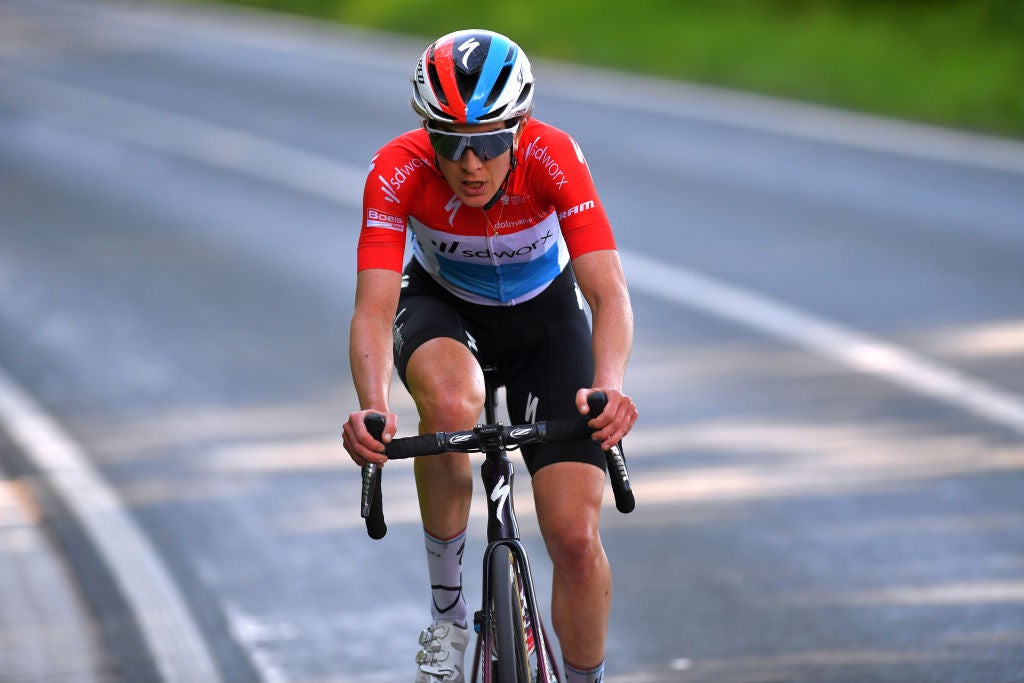Christine Majerus: 'Organizers cannot cut corners with safety'

Christine Majerus was appointed to the UCI Safety Commission in March (Photo: Luc Claessen/Getty Images)
Organizers should be held accountable for their own actions, says the sole women’s rider representative on the UCI Safety Commission.
Christine Majerus (SD Worx), who was appointed to the commission in March, would like to see more work done to tackle course safety and for the UCI to properly impose its regulations on organizers.
For Majerus, major incidents such as the crashes of Fabio Jakobsen and Remco Evenepoel in the men’s peloton last year have highlighted the need to ensure courses are safe and organizers cannot cut corners.
Also read: As the Anna van der Breggen era nears its end, SD Worx lays foundations of future domination
“I think the recent accidents in men’s cycling mostly really showed that it’s the main topic,” she said. “The security of the laps is the most important thing and then comes the responsibility of the organizations that they need to commit to it and the UCI needs to commit to their rules so there’s no bypassing safety rules.
“I think the bypassing has been happening for way too long, and as a rider, I feel that we get punished for quite little things pretty quickly. But the big important things we see during the races, in the laps, or in the convoy are left unpunished. I do understand we should get fines for things that we do wrong, but the things organizations are doing wrong sometimes can lead to devastating consequences.”
Some of the largest race organizers have made mistakes with safety measures, resulting in big incidents, but the problem is more pronounced in the smaller events where there are tighter finances and fewer paid staff.
Also read: Demi Vollering aiming high after whirlwind start to professional career
With relatively few big-budget races on the women’s calendar and many events put on by volunteers, Majerus would like to see the UCI support the smaller organizers to ensure top-quality safety measures are in place.
“The thing with women’s racing is that the smaller races are often not professional organizations,” she said. A lot is done with volunteers, which is not bad, and I 100 percent am happy those races are happening, but they also do have limited people to stand along the road and limited materials, and a limited budget.
Caught by surprise
Majerus was a late addition to the safety commission, and she was only given a place after many members of the women’s peloton expressed their displeasure at not being consulted on the introduction of a raft of new regulations for April, including the ban of the super tuck and the restrictions on throwing bottles.
While some male riders complained about not being informed of the rule changes – despite receiving an email from Matteo Trentin, their representative in the UCI Safety Commission – the women’s peloton had no idea it was coming as there was nobody representing them.
Also read: So long, ‘super tuck’ — new ban kicks in this week
“We were not asked, we were not at the table, there were no decisions made. We just read it in the press,” Majerus told VeloNews. “We knew it was maybe a good thing to push for someone in the women’s peloton to be able to sit at that table. I think the CPA (Cyclistes Professionnels Associés – the riders’ union) and the TCA (The Cyclists’ Alliance), and everyone involved kind of understood that too.
A professional with 14 years of experience in the bunch, Majerus has plenty of insight as to what is needed to make racing safer. After being overlooked at the start of the season, she wants to make sure that the women’s peloton has its voice heard just as loudly as the men.
After all, it’s all cycling.
“Maybe it’s my way of paying it back and trying to make it a better sport. That’s pretty ambitious, but I’m here to make sure it is represented,” said Majerus. “In the end, it’s not just women’s cycling and men’s cycling, it’s just cycling. We are all athletes we do the dame sport, and we invest the same time and energy into it.
Not here to make a revolution
Majerus may have strong thoughts and opinions on what she thinks is right for women’s cycling but accepts that not everyone will agree with her. She is fairly level-headed about what she will be able to achieve with her new role, and she isn’t setting out to overhaul what is already there.
“I seriously believe that the person at the table will not make a revolution at the UCI,” Majerus told VeloNews. “I think that 99 percent of the things that we are going to say or ask for will not pass and they will not change because they are protecting what they have been building up for years but it’s worth it for the one percent we can change. I will try to do it by being realistic about our chances to succeed. I know that mostly they will say no but at least we said it.”
The first three months of Majerus’ appointment to the commission have been relatively quiet. She’s in regular contact with the UCI, the two riders’ unions, and the riders themselves, but only a few minor issues have cropped up thus far. That’s fine by Majerus, as less work means there are fewer problems.